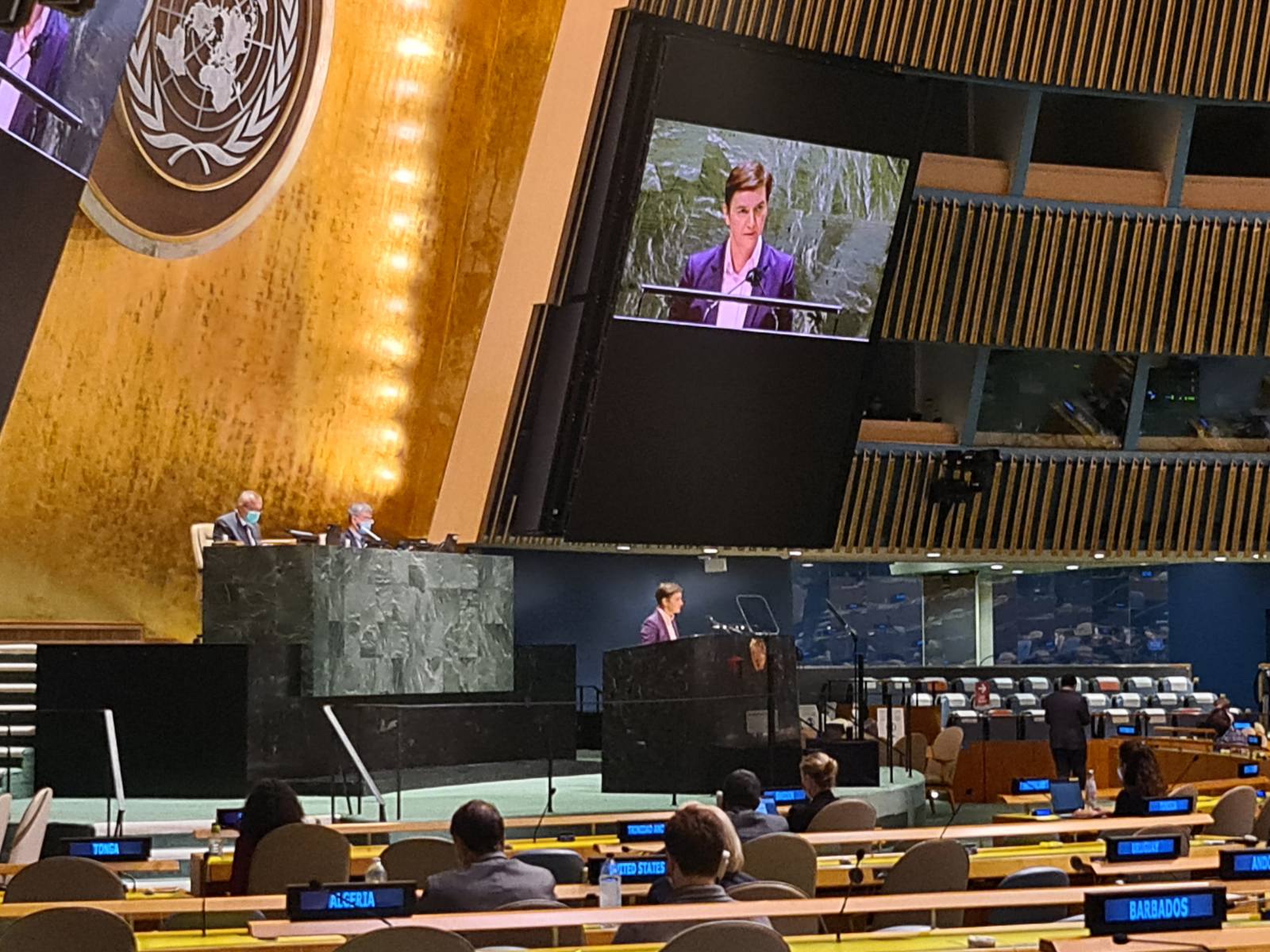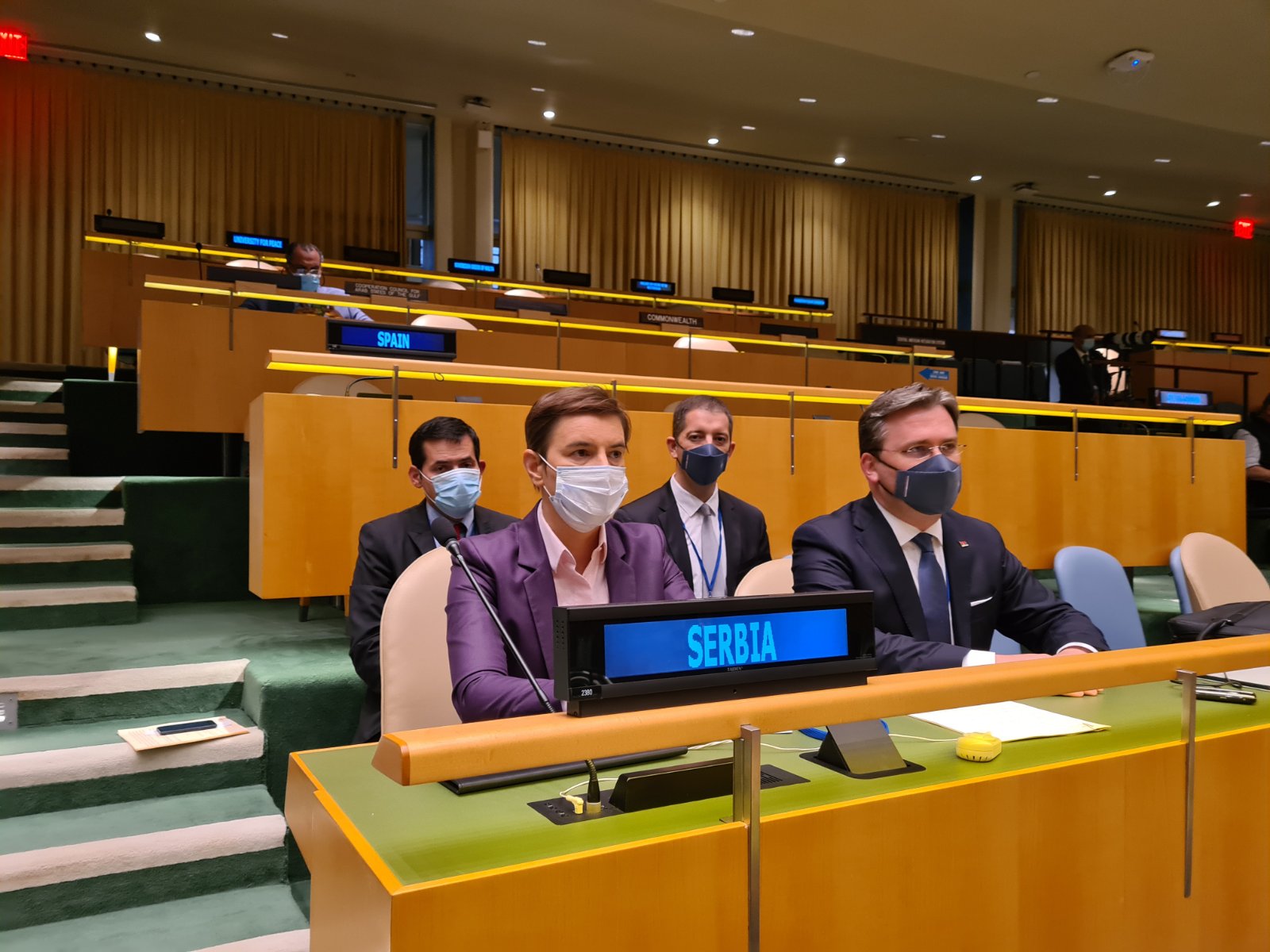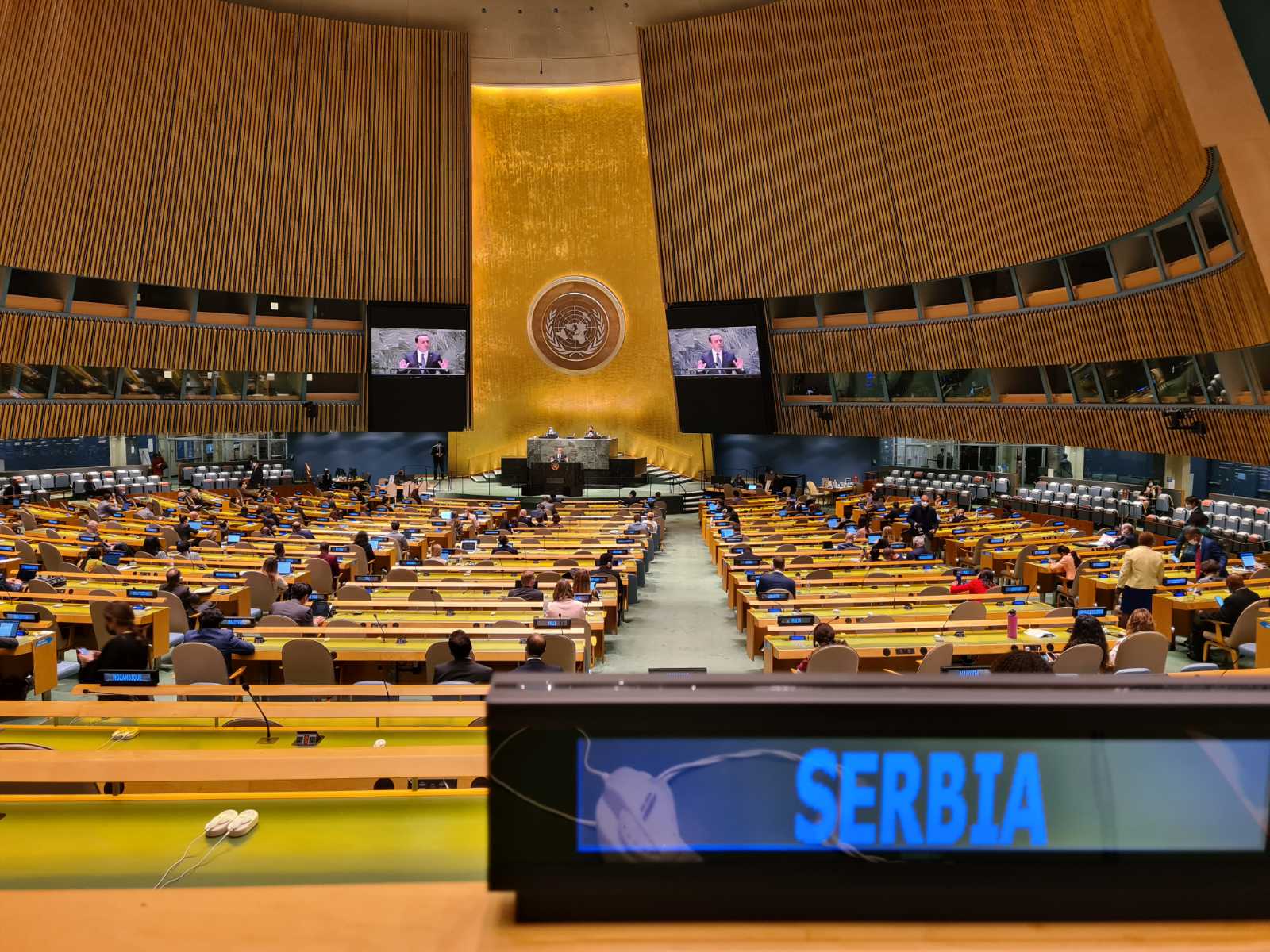25 September 2021

Prime Minister Ana Brnabic warned today that Pristina has seriously jeopardised local and regional stability after sending heavily armed special units to the north of Kosovo who are exerting ` against the peaceful Serbian population.
Brnabic spoke at the general debate of world leaders, as part of the 76th session of the UN General Assembly in New York.
We bring the Prime Minister's speech in its entirety:
Mr. President,
Mr. Secretary General,
Excellencies,
Ladies and gentlemen,
I have the great honor to address you today on behalf of the citizens of the Republic of Serbia.
Esteemed Excellencies Mr. Abdulla Shahid, Mr. Volkan Bozkir and Mr. António Guterres, I would like thank you for the active engagement, dedication, and leadership you have shown during these difficult times for the United Nations and all of humanity.
Serbia shares your conviction and we remain fully committed to supporting your efforts.
This year, we come together at a decisive moment in our history.
Covid-19 has shaken our foundations to the core.

At the same time, we are increasingly witnessing and experiencing effects of climate change.
And, finally, we are seeing significant shifts in global partnerships and alliances, trade wars between traditional partners and allies, protectionism instead of openness and free market, and overall uncertainty at an unprecedented scale.
Some of the pressing and extremely emotional issues that we have locally, in the Balkans, are still unresolved and while we are trying – and Serbia is especially dedicated to this – to change the future by working together and creating alliances, through initiatives such as the Berlin process or Open Balkan, others are trying to disrupt these processes, and instead of focusing on the future, they want to recreate the past – whatever the cost of that may be.
But, let me start with COVID:
COVID-19 pandemic has exposed critical weaknesses in the architecture of global governance. It has threatened to erase the progress many nations have achieved in recent years.
It has placed nations at a junction between isolation and collaboration, between panic and hope, between chaos and order.
The pandemic questioned some of the basic tenets of the open and cooperative international order.
Global exchanges, international communication, cross-border trade have all seen a vast decrease.
Curfews, restrictions on freedom and lockdowns of entire societies have created uncertainty in many segments of the individual lives of our citizens or – for that matter – our own individual perception of what freedom in today’s world even means.
For Serbia, this pandemic threatened to undermine everything we have been doing for the past 7 years, to crush all of the results and accomplishments of difficult reforms we initiated in 2014, and to propel us back to the times of high unemployment, rising public debt, uncontrollable deficit, and overall desperation.
Much as in any other country, COVID-19 has tested our nations’ resiliency and, this time, unlike during the global financial crisis – which was of much more limited scope and incomparable in consequences to COVID-19 pandemic – Serbia stood strong.
The reforms we undertook in the pre-COVID times made us more resilient than ever.
The fiscal consolidation, the budget surplus we had, efficient and predictable investment environment, became a lifeline that saved us from a recession during the pandemic and one that ensured we could support our citizens and our economy during these, most difficult of times.
Despite the effects of the crisis, Serbia has managed to preserve financial and economic stability. In 2020, we recorded a decline in GDP of only 0.9% – one of the best results in Europe. Our public debt remained below 60% of our GDP, average salary continued to grow by almost 10%, while despite the pandemic the number of people employed increased by over 3%.
The recovery in this year has been stronger than expected – our GDP will grow approximately 7%, and perhaps even stronger.
Prior to the pandemic, we have opened our borders to investment, technology, and ideas, and we managed to create peaceful and stable environment that allowed us to pursue rapid domestic transformation, with innovation and knowledge-based economy as the foundation.
The innovative advances we had made allowed us to diversify our capabilities when the virus hit – through e-Government, online education and digital textbooks, or central software system for a successful vaccination rollout.
We invested heavily in health infrastructure and strengthened the health system in order to respond to the current crisis, eternally grateful to the health care workers for their dedicated struggle.
Our decision to put geopolitics aside, and people at the center of our policies, is the reason we were able to acquire vaccines quicker than most other nations.
We did not discriminate between manufacturers, did not care whether vaccines are from the East or from the West, but chose to negotiate with all vaccine manufacturers deemed safe by regulators. This openness gave us the ability to purchase vaccines from around the world, giving our citizens the unique freedom to choose which vaccine they prefer.
Excellencies,
Serbia believes in solidarity between nations, multilateralism and helping others when in need.
Since the beginning of this year, we have made it our mission to support our neighbors, and all those in need, with COVID-19 vaccines and we have also allowed foreign nationals to come to Serbia to receive the vaccine which will protect their lives.
In total, Serbia has donated or allocated over a million doses of vaccines – of which 230.000 doses to the region; 300.000 doses for foreign nationals which came to Serbia to get vaccinated; and additional 570.000 doses to countries of Africa and Asia.
We will keep doing so, to the greatest extent possible, and until COVID-19 is behind all of us.
That is why we have also taken steps to acquire the technology to produce at least two types of COVID-19 vaccines to help improve global access so we can all be safe and victorious.
However, as stated by dignitaries of some of the largest nations during this General Assembly, there are other pressing issues that all of us need to keep addressing without any delay and in a bold manner – and that is climate change.
Serbia has redoubled its efforts to make our country safer and cleaner for its citizens, and by doing so, contribute to the fight against climate change and for environmental protection.
We are strongly committed to the implementation of the sustainable development goals and the Paris Agreement on Climate Change. We are committed to global efforts and will continue to work actively to meet our obligations under the UN Framework Convention on Climate Change.
We are about to submit our revised Nationally Determined Contributions to contribute to this critical global effort. We have already announced our intention to reduce greenhouse gasses for at least 33.3% compared to 1990, and 13.2% compared to 2010, which we are currently incorporating into our energy and climate strategic documents.
We work strategically on planning and investments in this sector. These investments are extremely expensive, requiring years and decades of commitment and a systemic approach - but we are clearly set on the path of this transformation.

Ladies and gentlemen,
Of all the challenges we face, the most worrisome for Serbia is the maintenance of peace and stability in the southern Serbian province of Kosovo and Metohija.
For more than two decades, we have been constantly drawing international attention to the problems that non-Albanian population is facing in Kosovo and Metohija. Physical safety, respect for and protection of human rights, especially of minority communities, are far from satisfactory.
We are now witnessing a constant increase in the number of attacks targeting Serbs, their property and religious heritage in Kosovo and Metohija.
To illustrate, there were 55 such incidents in 2014, 62 in 2016, 71 in 2020, and 100 since the beginning of this year. The total number of attacks in 2020 has already been surpassed by June of this year.
According to the UN, Kosovo and Metohija is still the territory with the least number of returnees (internally displaced Serbs) of all post-conflict areas in the entire world!
I will give you just a few examples to depict how life of Serbs in Kosovo and Metohija looks like.
On the 11th of May the house of Radoje Pumpalović, 81-years old returnee to Kosovo in the village of Dubrava, in Istok municipality, was attacked. This was the 5th attack on him in the same year. Again… he is 81 years old.
Since June 2021, multiple attacks were carried out against Dragica Gašić, 59-years old woman, the first Serb returnee in Đakovica after 22 years since the end of the conflict. Attacks include stoning of her apartment, banning her from shopping for food in the local store and petitions by civil society organization demanding her eviction from the city.
On 2nd of July, in the village of Gobulji near Vučitrn, a group of Albanians attacked 13-year old Nikola Perić. The attack occurred when he was returning home from the school playground with three friends.
Attacks on Serbian medieval churches, monasteries and monuments in Kosovo and Metohija, make them some of the most endangered cultural heritage sites in Europe.
Monastery Visoki Dečani was recently listed, by Europa Nostra, as one of the 7 Most Endangered Heritage Sites in Europe in 2021. The Advisory Panel of Europa Nostra noted that Dečani is the only monument in Europe under robust military protection for a continuous period of 20 years, although it constitutes a monument of ultimate historical and cultural importance for Europe and the world.
This spiral of violence occurring in Kosovo and Metohija culminated at the beginning of this week. On the pretext of enforcing new license plate rules, Priština dispatched heavily armed special units to the north of the province. This is yet another brutal violation of the Brussels Agreement, and this irrational show of force has ignited a major crisis. It disrupted the supply of food and medication to Serb communities in the north of the province. Local Serbs who peacefully gathered to protest this measure were met with tear gas and police brutality, thus seriously threatening local and regional stability.
Despite of all the challenges and daily provocations, Serbia remains strongly committed to finding a compromise-based solution that will ensure lasting peace and stability.
Dialogue and the implementation of the agreements reached – are the only proper way to resolve all open issues.
However, almost 9 years after reaching the Brussels Agreement, as the 1st agreement on normalization between Belgrade and Priština, the establishment of the Community of Serb Municipalities – the backbone of this agreement – has not yet even begun.
I would like to appeal, once again, to the international community, and especially the European Union, as the guarantor of the Brussels Agreement, to firmly insist that the Provisional Institutions of Self-Government in Priština start implementing all of the agreements reached.
The Republic of Serbia, by defending its sovereignty and territorial integrity, at the same time defends international law, the UN Charter, legally binding UN Security Council Resolution 1244, and the supreme authority of the Security Council when it comes to the preservation of international peace and security.
We attach special importance to the activity of the UN mission in Kosovo and Metohija and expect it to continue to implement its mandate in the Province in accordance with this resolution.
Dear friends,
Our generation shares the common destiny of the modern world, which is becoming increasingly complex in terms of geopolitics, technology, health, climate. In the face of these challenges, Serbia will continue nurturing international partnerships, on a predictable and transparent basis.
We will continue pursuing the rule of law reforms on our EU path, which is our strategic foreign policy goal. We see this as inseparable from achieving sustainable peace, stability and prosperity.
We will host, together with the Republic of Azerbaijan as the current chair of the Non-Aligned Movement, a commemorative high-level event marking the 60th anniversary of the First Non-Aligned Movement Conference, which was held in Belgrade in 1961. We are very much looking forward to hosting our friends from all parts of the world in Belgrade in October this year.
We will further enhance cooperation across the Balkans, through the Open Balkan initiative and Berlin process, by opening borders, harmonizing differences, and further integrating our region.
In conclusion,
Over the past 7 years, Serbia has been transformed: we sparked an economic revival, created opportunities for young people, cultivated a tech boom, and improved Serbia’s position abroad. The progress we have made has allowed Serbia to better face and survive the pandemic.
The world now faces a turning point. The recovery from COVID-19 and sustainable reconstruction will not proceed if issues, new and old, are not handled by joint forces and collaborative international actions.
This pandemic taught us one important lesson: unless all of us are safe, no one is safe – so we can either win together, all of us – regardless of how rich or poor, large or small, from Europe, Asia, Africa, America or Australia, or fail together.
But, if anything, the COVID-19 pandemic, as well as the issue of climate change, should have taught us to stand together.
Thank you.
Source: www.srbija.gov.rs